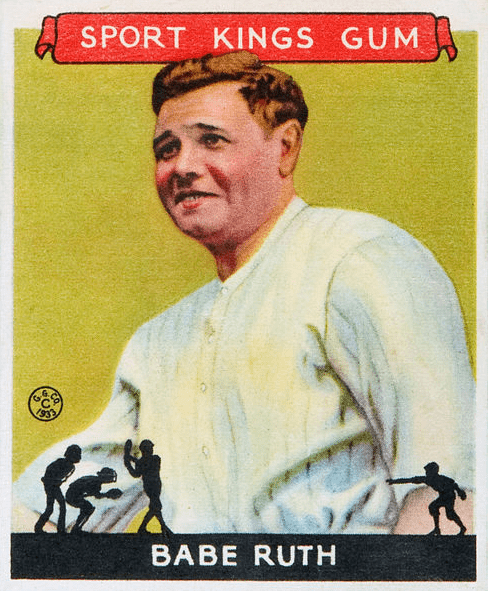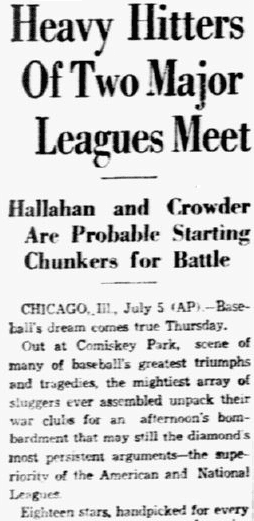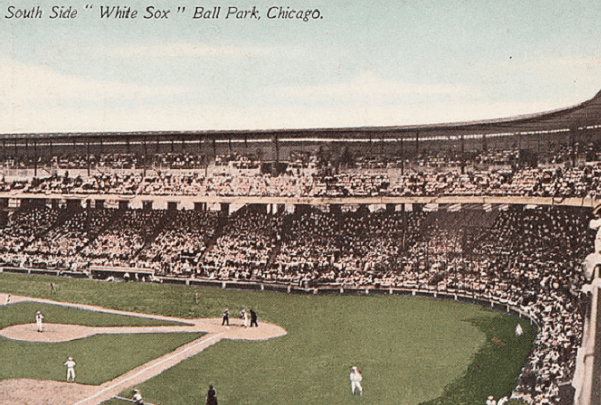It was supposed to be a one-time extravaganza, a showcase of baseball’s biggest stars staged as part of the festivities for the 1933 World’s Fair in Chicago. On 6 July 1933, Major League Baseball’s first All-Star Game was played at Comiskey Park, home of the Chicago White Sox, with a glittering array of the game’s best players. Of all the gathered superstars, none was bigger than the Yankees’ Babe Ruth.

Although aging noticeably, with years of hard living beginning to take their toll, the 38-year-old “Sultan of Swat” rose to the occasion. He won that first All-Star Game for the American League, with a two-run homer in the third (gaining the honor, appropriately enough, of hitting the first All-Star home run) and a game-saving catch in the eighth inning. The game proved to be such a great success that it became an annual tradition.
The following two newspaper articles describe the excitement of the first All-Star Game. The first article, published the morning of the game, describes what fans can expect in the upcoming clash for baseball supremacy between the two leagues. The second article describes the game’s action and Babe Ruth’s exploits.

Here is a transcription of this article:
Baseball’s ‘Dream Game’ Is Slated Today in Chicago
Heavy Hitters of Two Major Leagues Meet
Hallahan and Crowder Are Probable Starting Chunkers for Battle
Chicago, Ill., July 5 (AP) – Baseball’s dream comes true Thursday.
Out at Comiskey Park, scene of many of baseball’s greatest triumphs and tragedies, the mightiest array of sluggers ever assembled unpack their war clubs for an afternoon’s bombardment that may still the diamond’s most persistent arguments – the superiority of the American and National Leagues.
Eighteen stars, handpicked for every position, will represent each major league in the dream game that promises to be a nightmare for either the pitchers or sluggers or both. Marshaling the all-star forces will be the fiery John McGraw, drawn out of retirement to lead the National Leaguers, and the stately Connie Mack, one of the greatest masterminds baseball has ever known.
Sell Out Assured.
Forty-nine thousand spectators, promised a clear, cool day, already had their precious pasteboards to ensure a capacity throng at the White Sox battleground by game time, 12:30 p.m., Central standard time. Charity was a certain winner as all net profits were to be turned over to the Association of Professional Baseball Players of America, an organization formed eight years ago to care for old and disabled players and umpires.
As the zero hour neared for the big battle between such American sluggers as Babe Ruth, Lou Gehrig, Al Simmons, Jimmie Foxx and Joe Cronin, and the National League Big Berthas like Chuck Klein, Paul Waner, Frankie Frisch and Lefty O’Doul, nothing was definite in the respective line-ups except that the aforementioned powerhouses would swing into action. The pitching selections had everyone guessing, but at a late hour the best guess was that Bill Hallahan, ace southpaw of the St. Louis Cardinals, would oppose Alvin Crowder of Washington at the start.
Both Well Regarded.
Hallahan and Crowder were “naturals” as starting pitchers. Wild Bill has been the most successful National League pitcher in recent World Series against the American League sluggers. In 1930 he won one and lost one against the Philadelphia Athletics and in 1931 he copped two as the Cardinals broke through the American League victory march in the fall classic to become world champions. In the four World Series games he pitched 29 innings, allowed 21 hits, struck out 20 and walked 16. Crowder was well regarded because of his reputation to labor long and hard during hot weather. Ready to relieve him or any other starting pitcher picked by Manager Mack was Lefty Grove, who came here two days ahead of time to rest up for the engagement.
Carl Hubbell, the great star of the New York Giants, was considered a doubtful moundsman for the National League forces. Manager Bill Terry was dubious about the wisdom of starting his slab ace after that eighteen-inning shutout game he hurled against St. Louis last Sunday and, anyway, the Giants needed every victory Hubbell could pitch in their race for the National League flag. Larry Schumacher of the Giants and Lonnie Warneke, young Cub star, were ready to pitch, however, as were the American League pitching greats Lefty Gomez, Wesley Ferrell and Oral Hildebrand.
Switch Combinations.
The National Leaguers had two sets of outfielders, left and right-handed hitters, ready for action. The southpaw hitters were Klein, Paul Waner and Lefty O’Doul, with Chick Hafey, Pepper Martin and Biff Berger swinging from the right side. The infield presented batters from both sides. In the American League outfield ranks were two right-handed swatters, Al Simmons and Ben Chapman and “lefties” Earl Averill, Sam West and Babe Ruth. Gehrig, Gehringer and Dickey were American League infielders ready to swing from the port side.
Both managers, together with League Presidents Will Harridge and John Heydler were excited but confident over the game.
“I think we’ll win, but you can never tell about a game like this,” they replied in unison.
Here is a transcription of this article:
American League All-Stars Win Baseball’s Dream Game, 4-2
Ruth’s Circuit Smash and Running Catch Highlights of Spectacular Encounter
‘Cream of the Crop’ of Both Leagues Perform before Crowd of 49,000
Comiskey Park, Chicago, July 6 – (AP) – Out of the shooting stars of baseball’s big dream game blazed the mighty war club of the one and only Babe Ruth today to hoist the American League to a spectacular 4 to 2 triumph over the National League in the first all-star game in the Major’s history.
Before 49,000 fans that jammed Comiskey Park to see the stars of stars in action, the aging sultan of swat strode to the plate in the third inning, bristling with anger because of a strikeout in his first appearance, and smote one of Bill Hallahan’s looping slants into the lower right field grand stand seats. The blow, a line drive that everyone knew was a homer as soon as it left the Babe’s bat, came with Charley Gehringer of Detroit on base and clinched the game.
Baseball’s greatest single panorama of stars, hand-picked aces of each league, came for baseball’s big show in the back yard of [the] Chicago White Sox to provide thrills such as Lonnie Warneke’s relief pitching and hitting, Frankie Frisch’s home run, great catches and hard drives.
But Babe was the biggest showman of them all. His home run specialty won the game but to top it all off, he raced back against the right field wall to haul down a drive by Chick Hafey in the eighth to save the battle. It was a remarkable catch of a ball labeled as a triple with Frisch on first racing for home. Ruth departed from the battleground after that and the throng, excited and roaring, thundered a big ovation to the greatest slugger of them all.
As Ruth’s long range hit won the game, and his great catch saved it, none of the stars even came close to matching him as the hero of the day, but Warneke ranked second. The pride of the Ozarks relieved Hallahan in the third inning, halted a rally by forcing Al Simmons of the White Sox into a double play, and scored the first run for his mates after slamming a triple to right that Ruth lunged for and missed.
Warneke allowed six hits and one run in four innings to muffle the big American League guns. Then there were Lefty Grove, ace southpaw of the Athletics and Carl Hubbell of the New York Giants, who received big ovations for their relief pitching. In three innings, Grove, successor to Alvin Crowder of Washington, who allowed three hits and two runs in three innings, allowed but three hits. Hubbell yielded but one hit in two innings but the damage had been done.
As 60-year-old John McGraw, lured out of retirement to manage the first all-star National League team, and stately 71-year-old Connie Mack directed the fire of the Americans, the battle raged on even terms in the first inning except for Hallahan’s wildness. The National Leaguers went out in order in their half of the initial inning, and the Americans had one man stranded as Hallahan struck out Ruth, after Gehringer had walked with one down, and then forced Gehrig to tap weakly to first base.
Vernon Gomez, the surprise starting pitcher for the junior circuit, drew first blood in the second inning to send his mates ahead. Hallahan forced Al Simmons to fly out, but Jimmy Dykes and Joe Cronin, youthful boss of the Senators, drew walks. Rick Ferrell, Red Sox catcher, flied out to Chuck Klein, but Gomez slapped a hard single to left, scoring Dykes. Chapman ended the inning by forcing Gomez.
The Nationals threatened in their half of the second when Hafey and Bill Terry singled in succession, but Gomez, aided by fine support, stopped them. Wally Berger hit into a double play and Dick Bartell struck out.
The stage was all set for the Bambino in the eventful third. Hallahan started himself on the road to disaster by passing Gehringer for the second successive time. Ruth then stepped up as a mixed chorus of boos and cheers came from the vast assemblage. With the count one and one, he caught Hallahan’s low curve and bang! out of the park it sailed, carrying the ballgame with it.
It wasn’t until the sixth inning that the Nationals could break through for a score.
Lefty O’Doul pinch batted for catcher Jimmy Wilson and was an easy out. Warneke then cracked his triple and scored as Dykes threw out Pepper Martin, a hero of the 1931 World Series, but a bust today. Frisch followed him with a homer to the right field seats, Klein added fuel to the National hopes with a single but Hafey bounced out, Dykes to Gehrig.
[pl_section section=”embed” id=”773951751″]
In their half of the sixth, the Americans scored their final tally. Dykes opened with a single, sprinted to second on Ferrell’s sacrifice and scored as Earl Averill of Cleveland, batting for Crowder, rammed a single to center.
The Nationals had another big chance in the seventh as Berger and Pie Traynor roosted on third and second, but two Cubs, Gabby Hartnett and Woody English, acting as a pinch hitter, failed as Grove whipped his fast breaking curves across. Hartnett struck out and English sent a short fly to Simmons in center.
Ruth stopped the eighth inning rally with his great catch and in the ninth, Grove collared the Nationals with ease, setting down Terry, Berger and Tony Cuccinello of Brooklyn in order. Tony, a pinch hitter, churned the air, a strike out victim for the triumphant Grove.
Frisch and Terry were the only National Leaguers to collect two hits with Ruth and Dykes getting the same number to lead the Americans. Lou Gehrig, the Babe’s home run twin, went hitless in two official times at bat. Ben Chapman, Yankee speed king, flashed his specialty once by catching the National League infield asleep with a bunt and beating it to first with ease.
An online collection of newspapers, such as GenealogyBank’s Historical Newspaper Archives, is not only a great way to learn about the lives of your ancestors – the old newspaper articles also help you understand American history and the times your ancestors lived in, and the news they talked about and read in their local papers. Did you ever see any of baseball’s greats play in their prime? Please share your stories with us in the comments.
Related Baseball Articles:

